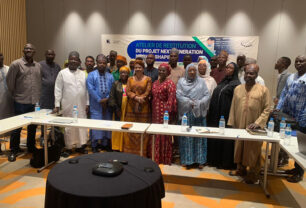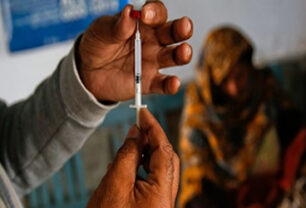
The Pneumo-DX study was officially launched on February 26, 2024, during a field visit. Ten primary healthcare facilities in the Rohingya refugee camp of Cox Bazar, where the study will be held, were visited by the project’s stakeholders to assess their readiness and mark the launch of the study.
Conducted in partnership with ideSHi (Institute for Developing Science & Health initiatives, Bangladesh), the Bangladesh Department of Health, Hospices Civils de Lyon (HCL, France) and the Mérieux Foundation, the Pneumo-DX study has a dual objective. On the one hand, it aims to improve case identification, diagnosis and management of children with severe pneumonia in crisis situations where access to imaging and laboratory facilities is limited or non-existent. Secondly, the study will provide national authorities with epidemiological data on the circulation of S. pneumoniae serotypes and on potential serotype replacement, in order to evaluate PCV vaccination campaigns.
To achieve this goal, educational programs for front-line and community health workers in participating primary health care units will be set up to strengthen their knowledge and skills in relation to childhood pneumonia.
The project will draw on the Mérieux Foundation’s experience in capacity building for healthcare infrastructures. The study will provide the participating units with rapid oximeters and respiratory equipment to refine the diagnosis of pneumonia cases, and in particular their severity.
Point-of-care etiological tests may be associated with the study, based on epidemiological data from the recruitment area, to improve diagnostic accuracy by differentiating more easily between several febrile illnesses.
The study also suggests strengthening triage and referral systems to improve case management.
Pneumo-DX also includes a third area of intervention, with community education programs for mothers and other family members on identifying the signs of pneumonia.
The rationale behind this diagnostic study is that improved recognition of the signs and symptoms of pneumonia by primary and front-line health workers, while having access to the necessary resources, would lead to more accurate clinical diagnosis, improved pneumonia case management and, ultimately, a reduction in childhood morbidity and mortality.
In addition, improving mothers’ knowledge and skills in recognizing childhood pneumonia will enable them to act appropriately and seek care in a timely manner, thereby increasing the child’s survival rate.
The heavy burden of pneumonia
Pneumonia remains the leading cause of death in children under 5, resulting in over 900,000 deaths a year (McAllister 2019).
The diagnostic capacity to identify it is of particular concern in resource-limited countries, which often lack laboratories and diagnostic imaging equipment. In addition, pneumonia can be confused with other illnesses with similar symptoms, regularly leading to misdiagnosis and inappropriate treatment.
In these conditions, the management of pneumonia relies essentially on clinical diagnosis, based on a complex case definition criterion that is often applied by inexperienced primary care workers, and treatment is often sub-optimal for the patient.
It is essential to find ways of improving diagnosis in first-level healthcare facilities in order to reduce morbidity and mortality, particularly in refugee camps where living conditions accelerate the spread of infectious diseases, especially viruses responsible for respiratory infections.




